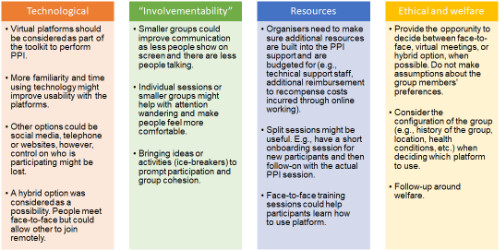Use of the E-nabling Digital Co-production Framework is recommended to improve digital Patient and Public Involvement in dementia research
Guidance
To better understand how digital Patient and Public InvolvementInvolving ordinary people and local communities in the planning, commissioning, delivery and evaluation of the health and social care services they receive. (abbreviated to PPI) (e-PPIElectronic/digital Patient and Public Involvement More) and blended approaches (hybrid digital and face-to-face PPIPatient and Public Involvement Involving ordinary people and local communities in the planning, commissioning, delivery and evaluation of the health and social care services they receive.) in dementia research can be better facilitated, it is recommended to use the E-nabling Digital Co-production framework.
Explanation and Examples
Qualitative research showed that the E-nabling Digital Co-production framework (see Figure 1) is useful for researchers, PPIPatient and Public Involvement Involving ordinary people and local communities in the planning, commissioning, delivery and evaluation of the health and social care services they receive. coordinators and public contributors in advancing understanding of the challenges and opportunities provided by e-PPIElectronic/digital Patient and Public Involvement More and blended (hybrid) approaches. The framework explores preferences and implications of using different modalities of PPIPatient and Public Involvement Involving ordinary people and local communities in the planning, commissioning, delivery and evaluation of the health and social care services they receive. and it can be useful for specific populations and contexts, for example in dementia technology research.
In this context, e-PPIElectronic/digital Patient and Public Involvement More needs to optimise engagement by taking into account participants’ abilities to remember instructions on how to join the e-meeting, their levels of attention and concentration, or the need for explicit cues to the speaker. The level of support must be determined which requires specialised training for facilitators or additional supporters during the meeting.
Facilitators should be aware that online meetings may deprive caregivers of respite and support that would be present face-to-face, and may exclude those who live alone or need more support.
Some of the opportunities of e-PPIElectronic/digital Patient and Public Involvement More are related to removing geographical constraints allowing wider participation and saving resources in terms of time, not having to travel to meetings, arrange venues, catering or other coordination such as transporting PPIPatient and Public Involvement Involving ordinary people and local communities in the planning, commissioning, delivery and evaluation of the health and social care services they receive. representatives.
Themes
ePPI Patient and Public Involvement
Target groups
Family carers People living with dementia PPI coordinators Public contributors ResearchersType of evidence
Mauricio Molinari Ulate (DISTINCT ESR7)
Qualitative study, online focus groups, digital PPI
References
Molinari-Ulate, M., Woodcock, R., Smith, I. et al. Insights on conducting digital patient and public involvement in dementia research during the COVID-19 pandemic: supporting the development of an “E-nabling digital co-production” framework. Res Involv Engagem 8, 33 (2022). doi.org/10.1186/s40900-022-00371-9


